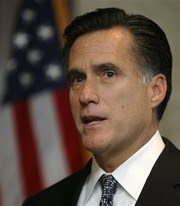By LIZ SIDOTI, Associated Press Writer Mon Jun 18, 3:53 PM ET
WASHINGTON - Rudy Giuliani, John McCain (news, bio, voting record) and Mitt Romney dominate the 10-man field for the Republican presidential nomination, with Fred Thompson threatening to roil an unsettled race.
Rare circumstances serve as the backdrop.
The sitting Republican president and party standard-bearer, George W. Bush, has abysmal job-performance ratings. Vice President
Dick Cheney' name=c1> SEARCHNews News Photos Images Web' name=c3> Dick Cheney doesn't want the job and there's no natural heir, a significant departure for a party that historically has nominated the next in line.
The result is one of the most fluid GOP races in half a century.
Giuliani, a former New York mayor; McCain, an Arizona senator; and Romney, an ex-governor of Massachusetts, are the strongest contenders. They lead the field in organization, endorsements and money.
But Thompson, the former Tennessee senator and "Law & Order" actor, casts an enormous shadow and placed a close third behind Giuliani and McCain in a recent Associated Press-Ipsos poll. All but certain to enter the race, he's become a favorite of conservatives who are underwhelmed with the current field.
Underdog candidates — former Arkansas Gov. Mike Huckabee, Kansas Sen. Sam Brownback (news, bio, voting record) and five other long-shots — are looking to catch fire in certain states.
The
Iraq' name=c1> SEARCHNews News Photos Images Web' name=c3> Iraq war, immigration, terrorism and abortion are the hottest issues.
To win, a candidate must collect a majority of delegates — 1,255 to be exact. That number, like the date of each state's contest and the delegate allotments, is in flux. Voting begins in January. Here's an early look at the race:
___
IOWA — Jan. 14 (32 delegates)
Romney has emerged as the one to beat, and his strategy calls for winning the caucuses to ride a momentum wave to New Hampshire. Unknown here before 2007, he's spent $1 million in TV ads and direct mail to introduce himself, visited 11 times and hired veteran operatives. McCain is vigorously campaigning here after skipping Iowa in 2000 and has built an organization that rivals Romney's. The 70-year-old senator is trying to overcome his unpopular support for immigration legislation, the perception that he is yesterday's candidate and doubts that he'll be a loyal Republican. Giuliani has sent mixed signals about how hard he plans to compete here. His support for abortion rights and gay rights alienates some conservatives. Both Giuliani and McCain bowed out of a high-profile straw poll in August. Thompson could find success in Iowa. Lesser-knowns pinning their hopes on the state haven't broken through. Brownback may have the best chance and is courting the religious right.
___
NEVADA — Jan. 19 (33 delegates)
The state presents a new dynamic for Republican hopefuls, given that it recently decided to hold its Republican caucuses earlier than in past years. Giuliani, McCain and Romney are trying to determine how to hard to compete in Nevada; the focus has been elsewhere. Nevertheless, all three have raised money here and rank well in surveys. So does Thompson. From neighboring Arizona, McCain may have the best chance to capture Nevada. He's a frequent visitor and he can readily address Western topics such as water rights, American Indian issues, property rights, energy development and immigration. Nevada ranks in the top five of states with the most Mormons and, as a member of that faith, Romney could benefit. But McCain isn't ceding any ground and has dispatched Utah Gov. Jon Huntsman Jr., a Mormon and an ally, to campaign in Nevada. Giuliani has scooped up some high-profile endorsements. One unknown is how the immigration issue plays in the Hispanic-heavy state.
___
NEW HAMPSHIRE — Jan. 22 (32 delegates)
The state should be McCain's to lose, given that the senator bested Bush here by 18 percentage points in 2000. He is universally known and has an existing network of backers. But he's fighting the notion that he's different from the rebel the state once embraced, and he's facing a serious challenge from Romney. The Bostonian has a vacation home here and is well-known as the GOP governor of liberal Massachusetts. His $1 million in TV ads have focused on a conservative message as he runs to the right of his rivals. Another Northeasterner, Giuliani, also has appeal here, with his moderate-to-liberal record. Independents are a wild card. In the last contested GOP primary eight years ago, they voted en masse in the GOP primary and helped McCain win. This time, the state is trending Democratic and independents could choose to participate in the star-studded Democratic contest. None of the long-shots is gaining steam.
___
FLORIDA — Jan. 29 (112 delegates)
The early advantage goes to Giuliani. The delegate-rich Sunshine State has a Republican electorate most amenable to his moderate-to-liberal views and plenty of retired New Yorkers. Giuliani, who has a double-digit lead in state surveys, has focused on solidifying support and building an organization here, perhaps more so than anywhere else. Giuliani also is a celebrity who attracts cash, and strong fundraising is crucial with Florida's expensive media markets. Romney is giving chase to Giuliani and has the support of several allies to popular former Gov.
Jeb Bush' name=c1> SEARCHNews News Photos Images Web' name=c3> Jeb Bush. McCain, too, is a regular in Florida, and campaigned for current Gov. Charlie Crist last fall. Three variables loom large: the impact of the strong-polling Thompson, how immigration plays in the Cuban and Haitian bastions and the fallout of the state's decision to move up the primary in violation of party rules. The GOP says states that cross it will lose half their delegates.
___
SOUTH CAROLINA — Feb. 2 (46 delegates)
The Southern state is ripe for Thompson to bigfoot the top-tier contenders who are locked in a three-way race but haven't won over influential conservatives. A state survey shows the all-but-declared candidate essentially tied with Giuliani. McCain's state campaign is a powerhouse in organization and endorsements, but his unpopular immigration stance and lingering resentment from a bitter 2000 race complicate his quest. He counts the state's popular Sen. Lindsey Graham (news, bio, voting record) as a close friend and adviser. Romney has a strong presence and has spent money on TV ads and direct mail. But his Mormon faith is an obstacle in a state heavily populated by Christian evangelicals. Giuliani is popular with moderates along the coast; conservatives elsewhere don't like his support for abortion rights and gun control. Huckabee is a possible dark horse, given his credentials as a Southern Baptist preacher and former governor. But some voters aren't convinced he can win in November. Enter Thompson, a Tennessean with a right-leaning Senate resume.
___
MEGA TUESDAY — Feb. 5 (at least 831 delegates)
It's all about momentum and money on Mega Tuesday; candidates will need heavy doses of both to compete in more than a dozen states holding contests. Retail politicking will give way to ultra-expensive TV advertising. More than 50 percent of the GOP delegates will have been chosen when voting ends on what amounts to a national primary day. If Giuliani survives earlier states, he could be a force given the roster of Northeastern states where he has ties and delegate-rich states where he could have appeal — California (173), New York (102), New Jersey (52) and Connecticut (30). The Giuliani camp has suggested the rapid-succession primary calendar may dilute the importance of leadoff states of Iowa and New Hampshire. Thus, he also has been spending time in Feb. 5 states and paying particular attention to California. There, and in some other states, candidates can win delegates congressional district by congressional district, and they may try to cherry pick the districts offering the most delegates. McCain and Romney contend the compressed calendar makes early states even more important. Even so, they, too, have ventured to California and are establishing operations in other Mega Tuesday states. Romney was born and raised in Michigan, and he's angling to triumph there. McCain won the state in 2000 and wants a repeat. Thompson's Tennessee and nearby Georgia also vote that day. Arkansas, where Huckabee was governor for 10 1/2 years, is on the roster as well.





















